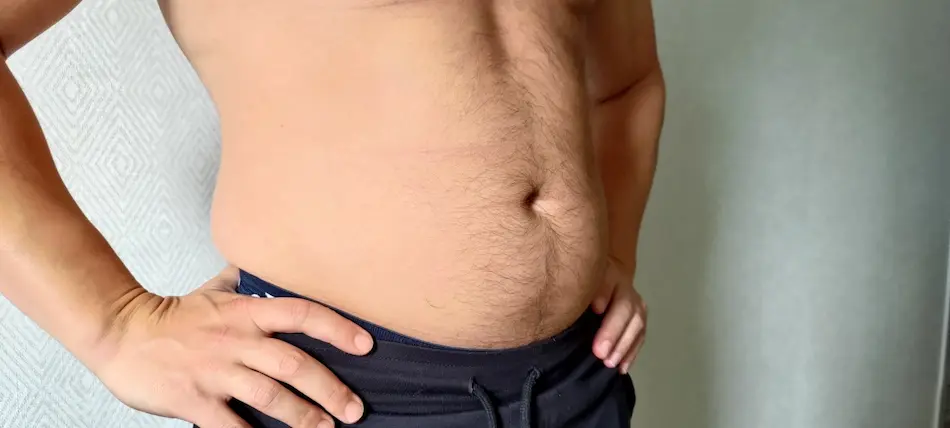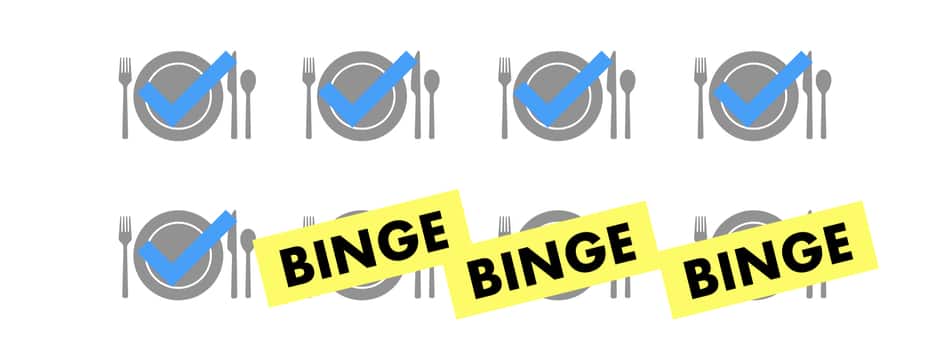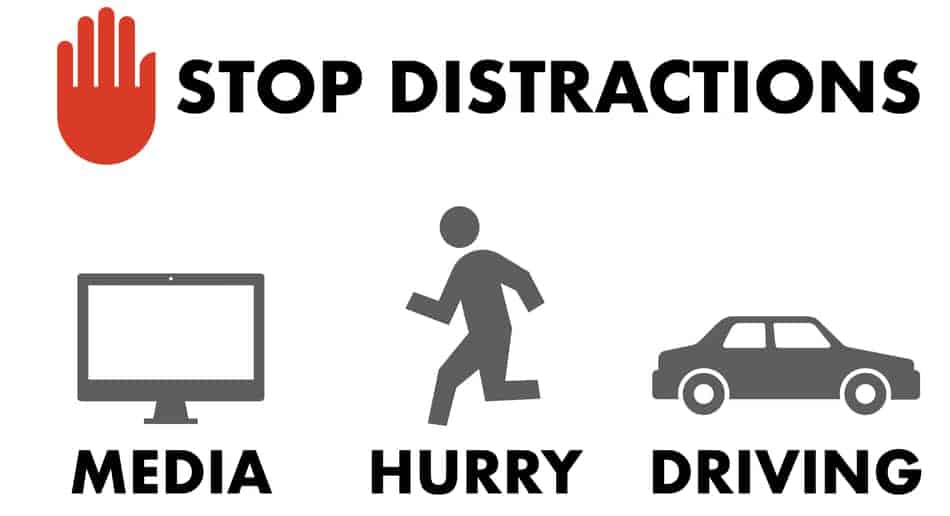(Take a look at the picture below.)

That’s how my belly looks after I get off the rail, rave my pantry, and overeat on OMAD.
Luckily, after doing the OMAD diet for almost a year, I found some practical ways to stop overeating (even when my belly is growling.)
Overeating your one meal a day
Is it possible to overeat on OMAD? Of course, especially if you eat too much food at once.
Every time when I overeat my one meal a day I feel like my belly explodes, and my energy levels drop, followed by an after-dinner dip.
However, I also noticed that overeating one meal a day does not make me gain weight or jeopardize my results. (Even if that happens more than once.)
This means, even if you eat a little bit more, you will be fine. The problem is when I crack under pressure and completely lose control.
Why do I overeat on OMAD?
I often start my week strong with iron willpower and enthusiasm, but then something happens, and I find myself raiding the refrigerator.
This is usually manifested in having a few days in a row where I feel emotional and overeat to feel better.
(Like this.)

OMAD makes me feel hungry
Another reason why I overeat on OMAD is because of a strong feeling of hunger. (I feel uncomfortable with hunger.) And, when this happens, I often freak out from the smallest rumblings in my stomach.
Eating only one meal a day is not a picnic. The beginning was the worst. Initially, I was thinking about the food (a lot).
Later was a little easier. I felt like my stomach was getting ‘smaller’ and I was getting full with less food.
Stress makes me eat more
Another reason why I tend to rave my refrigerator on one meal a day is stress. After I changed my job, I was getting swamped at work for most of the day (and evening).
Things get out of control and I had to bring my laptop home and work from my desk (often until midnight). That’s when I overeat.
How to stop overeating on OMAD
Technically, you can overeat and eat too much during OMAD intermittent fasting. These tips and hacks can help you regain control and stop overeating on one meal a day diet.
1. Eat slowly
I’m not gonna brag, but this single habit made a huge difference. Eating slowly can make you stop eating before it’s too late.
I often stretch my time until I get to 20 minutes per meal. Take a pause every 5 minutes and assess how hungry you are right now.
Slow eating helps you to tune in to your body signals and it delays the satiety response. This means you will feel fuller with less food.
2. Put your fork down between your bites
Put down your fork between every bite. Make sure you chew your food for longer than usual before you pick up your fork again.
Increase the number of chews you do for each bite you take. I started with 30 chews, now I can even do 50 chews or more.
Also, putting your fork down allows you to not only slow down but also focus on what you eat.
3. Breathe and relax
I know that sometimes it may feel like you had a really long day, and all you can think of is to get food into your mouth. But patience is the key.
Don’t rush with your meals. Take time to breathe and relax. You will enjoy your meal much better when you are not feeling rushed.
4. Set up the timer
Another method you can use is simply to set up the timer for 20-25 minutes. This will give you a time frame of how long exactly you should be eating.
According to a recently published randomized controlled trial, it takes around 15-20 minutes for the satiety to kick in.
This means if you finish your meal in 5 minutes, your body won’t register that you are full, so you may continue to eat or be hungry again very soon.
So by timing yourself you consciously extend the time. This practice will also help you to tune in to your body signals and notice when you feel hungry, no longer hungry, and full.
5. Smell and taste
Try to sense the taste, smell, and texture. Focus on each bite. (Seriously, there is some physiology behind smelling and tasting each bite.)
“Smelling and focusing on flavor is necessary to stimulate satiety hormones to raise,” says a professor of experimental psychology at the University of Sussex, Martin Yeomans, Ph.D.
In his research review article published on ResearchGate, Dr. Yeomans describes “food-related odors provoke salivation and the release of gastric acid and insulin. So it starts your digestion before you even eat.”
“If you don’t smell your food, and you just rush through the meal, your body doesn’t even know you are eating,” explains Dr. Yeomans.
I noticed that eating slowly and smelling food makes it even tastier! (And the junk food tastes like cardboard.)
If you don’t believe me, try to chew for 1 minute on the Dorito chip. Once all the additives dissolve, the chip will taste disgusting. Seriously.
6. Eat mindfully without distractions
Organize your meal time and turn off any noise. That includes phone notifications, TV, or other media. I found that eating in a quiet environment makes me eat more mindfully (and enjoy my meals more.)
Some evidence shows eating with distractions influences the amount of food that we consume.

To be more precise, we eat more while watching TV, and eat less when eating mindfully, the publication suggests.
Also, I try to sit down at the table to eat, rather than consuming my meal while walking on the street, driving a car, or in front of the computer screen.
7. Stop eating when you’re no longer hungry
Stop eating when you are no longer hungry. Not when you’re full. Not when you eat everything from the table. Not when the TV show is finished.
This way you can reduce food intake. You stop eating when you’re satisfied, no longer hungry, or 80% full.
My thoughts
I found that overeating is part of the process. I don’t aim to be perfect. I rather aim to be a little better than before.
Even when I overeat, I don’t think too much about it. Move on. Try to notice and learn why you did it (and hopefully avoid it next time.)

Thank you so much for this! I needed to read exactly what you said. I started OMAD almost a month ago and I feel bloated almost every day after eating, because I am afraid I may eat too little and then I end up eating too much or simply because there are so many things I was craving through out the day. I am happy to find out I am not the only one 😅